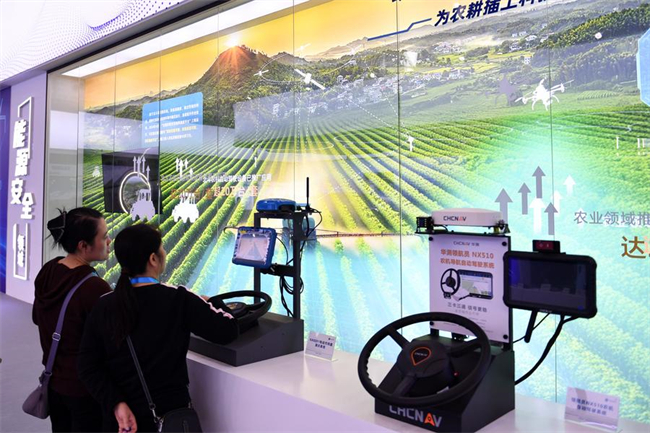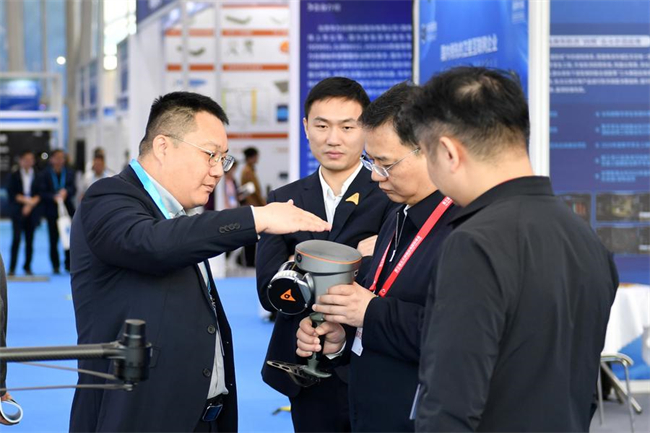An aerial drone photo taken on Oct. 24, 2024 shows the outdoor exhibition area of the 3rd International Summit on BDS (BeiDou Navigation Satellite System) Applications in Zhuzhou, central China's Hunan Province. (Xinhua/Cheng Ji'an)
CHANGSHA, Oct. 25 (Xinhua) -- With a quick online reservation, residents in the central Chinese city of Zhuzhou can now board a bus within five to 10 minutes at "virtual bus stops." Introduced in mid-October, this bus fleet serves a community of 120,000 people, guided by China's homegrown BeiDou Navigation Satellite System (BDS).
Named after the Big Dipper constellation, BDS has become integral to navigation for both public transportation and specialized fields, including smart logistics, agriculture and disaster monitoring.
This expansion of BDS applications drew attention at the just-concluded 3rd International Summit on BDS Applications in Zhuzhou, Hunan Province, where the technology's growing versatility was on full display.
Visitors experience driving devices of agricultural machinery at the 3rd International Summit on BDS (BeiDou Navigation Satellite System) Applications in Zhuzhou, central China's Hunan Province, Oct. 24, 2024. (Xinhua/Chen Zhenhai)
DRIVING GROWTH
Organizers said that 142 projects were signed and released during the summit this year, with a total investment of 58.2 billion yuan (about 8.2 billion U.S. dollars). The projects cover BDS applications in pipeline leakage detection, postal logistics, as well as disaster relief and prevention systems based in Indonesia.
The development of BDS has been boosting related industries. The total output value of China's satellite navigation and location services industry reached 536.2 billion yuan in 2023, an increase of 7.09 percent over the previous year, according to the White Paper on the Development of China's Satellite Navigation and Location Services Industry (2024).
Aarti Holla-Maini, director of the UN Office for Outer Space Affairs, told the opening ceremony in a video message that China is a central member of the International Committee on Global Navigation Satellite Systems and BDS is expanding its applications and services, while making them available for both industry and public sector users.
A visitor learns about a risk detection device at the 3rd International Summit on BDS (BeiDou Navigation Satellite System) Applications in Zhuzhou, central China's Hunan Province, Oct. 24, 2024. (Xinhua/Chen Zhenhai)
China began to develop its own navigation satellite system in 1994. The BDS-1 entered service and began providing positioning services in China at the end of 2000. Since that time, China has become the third country in the world with a navigation satellite system.
The BDS-2 was completed in 2012, providing passive positioning services to the Asia-Pacific region. In 2020, the BDS-3 was formally commissioned to provide satellite navigation services worldwide.
A bluebook on the development of the BeiDou industry was also released during the opening ceremony. "BDS services and related products have been exported to more than 130 countries, providing users with diversified choices and better application experience and promoting industrial development," the bluebook stated.
An exhibitor introduces a smart risk detection device to visitors at the 3rd International Summit on BDS (BeiDou Navigation Satellite System) Applications in Zhuzhou, central China's Hunan Province, Oct. 24, 2024. (Xinhua/Chen Zhenhai)
EMERGING SECTORS
In Zhuzhou, a logistics center has been testing drones that rely on BeiDou's pinpoint navigation. The drones can land with accuracy within just a few centimeters, enabling more efficient and reliable deliveries.
Currently, 21 low-altitude routes in Zhuzhou support services like medical transport, package delivery, agriculture and emergency supply delivery.
"The potential for BeiDou technology in low-altitude economic fields is vast, particularly in boosting airspace collaboration and enhancing navigation services," said He Zhiyi, deputy general manager of China Electronics Corporation Xinghe Electronics.
Industry experts see BeiDou's reach extending beyond traditional areas like surveying and mapping, into UAVs, autonomous driving and robotics, where digital transformation bridges both emerging and established sectors. "BeiDou is accelerating productivity in these fields," said Huang Lei, vice president of BDStar Navigation Co., Ltd., a leader in China's satellite navigation sector.
Bakhtiyor Mirzaev, a consul with Uzbekistan's consulate general in the southern Chinese city of Guangzhou, commented, "I was impressed by the BDS applications in various fields and I hope the two countries can have more technological cooperation."
Source: Xinhua












